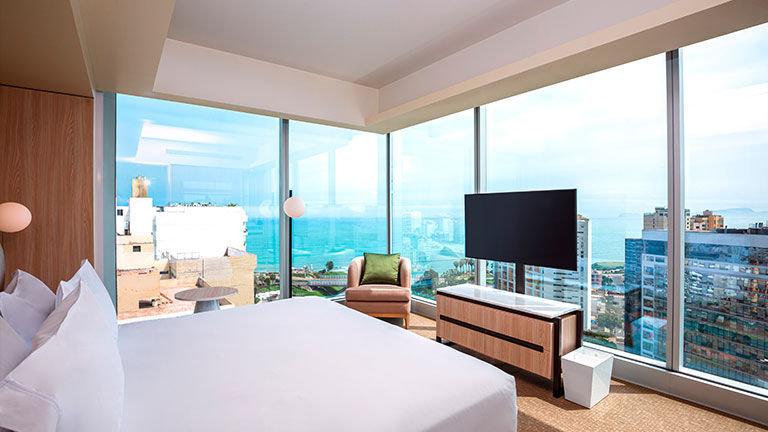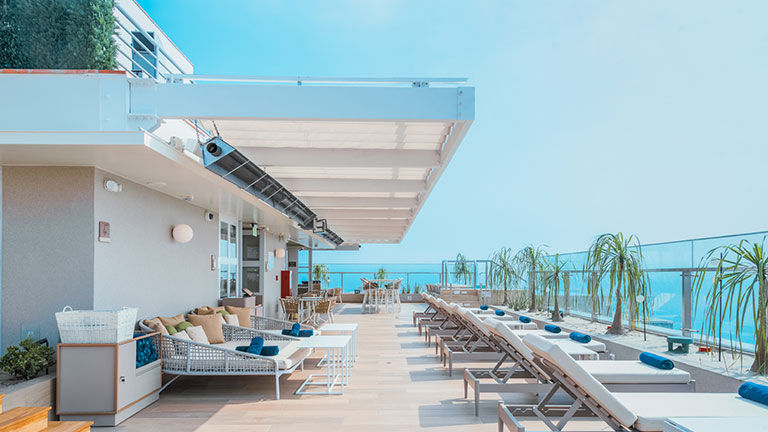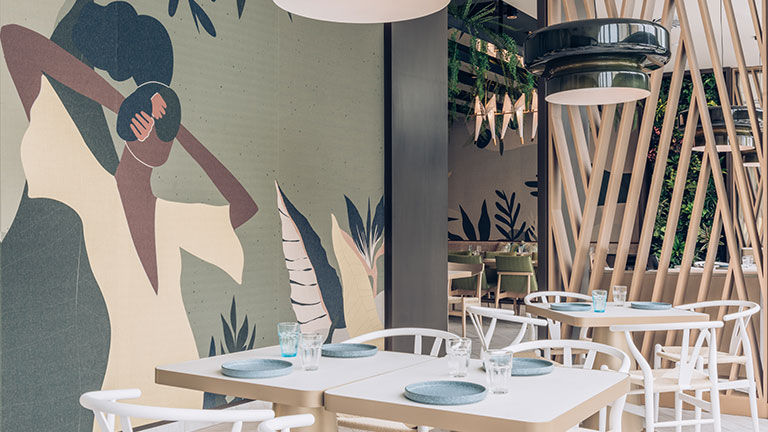Thanks to Spain-based hotelier Iberostar, Lima, Peru, is now home to the city’s first single-use plastic-free hotel: The five-star Iberostar Selection Miraflores.
The property offers a luxurious city hotel stay experience and is one of the newest properties in the Iberostar portfolio, which spans more than 100 hotels in 16 countries. The brand joins Marriott International, Hilton, Radisson Hotels and Best Western Hotels & Resorts in Lima’s trendy Miraflores neighborhood.
Opened last October, the Miraflores outpost features one of Iberostar’s newest concepts — Cosmos Level — with guestrooms on the hotel’s upper levels and access to an exclusive space that features a snack and drink bar, concierge service and private meeting spaces. Inspired by the Pacaya Samiria Nature Reserve, flora-inspired design elements, including verdant murals and hanging ceiling plants, are dispersed throughout the hotel.
The 214 bright and spacious guestrooms have floor-to-ceiling windows, which showcase panoramic views of the Malecon promenade, the Pacific Ocean and Peru’s capital city. Sweeping vistas are also enjoyed from the 18th-floor rooftop infinity pool and 24-hour gym on the 17th floor. A yoga mat is included in each room, and the spa features unique massages and a dry sauna.
 A junior suite at the property
A junior suite at the property
Credit: 2022 Iberostar Selection MirafloresDespite all that the hotel had to offer during my stay, I found a true selling point to be the hotel’s commitment to sustainability.
Iberostar’s Sustainability Efforts and Goals
Even as a plastic-free hotel, the property doesn’t lack in amenities. Water fountains are located on each floor, and in the guestrooms, plastic is nonexistent. The in-room coffee machine utilizes biodegradable coffee pods, and even the bathrooms avoid single-use plastic by replacing small shampoo and conditioner bottles with refillable, cruelty-free and biodegradable toiletries from Botanicus.
“Some of the sustainable things will be very obvious when clients arrive, such as the lack of single-use plastics, [while] others will be more behind-the-scenes, such as waste segregation, to ensure all products have value at the end of their use at our properties,” said Megan Morikawa, global sustainability director for Iberostar. The hotel recycles its waste with Sinba, a company that recycles food waste per the 3R philosophy (reduce-reuse-recycle).
The Miraflores property is also abiding by Iberostar’s Wave of Change program to preserve seas and oceans through a circular economy, which promotes the responsible consumption of seafood and improves coastal health.
“We’re pushing the bar further for what it means to make a positive impact in our destinations,” Morikawa said.
We’re pushing the bar further for what it means to make a positive impact in our destinations.
Iberostar has also committed to its role as a leader in responsible tourism through its work with the United Nations World Tourism Organization and the United Nations Environmental Program on the Global Tourism Plastics Initiative to create recommendations for how hoteliers can respond to the COVID-19 pandemic without a massive uptick in plastic use.
 Iberostar Selection Miraflores features a rooftop with a restaurant and sweeping views.
Iberostar Selection Miraflores features a rooftop with a restaurant and sweeping views.
Credit: 2022 Iberostar Selection MirafloresThe hotel company’s 2030 Agenda also centers around being both waste-free and 100% responsible in its seafood supply chain (certified by an eco-certification that has been benchmarked by the Global Sustainable Seafood Initiative and rated “yellow” or “green” by the Monterey Bay Aquarium Seafood Watch Program) by 2025. The hotel also aims to be carbon-neutral by 2030.
“Having single-use plastic-free hotels is one of our first steps toward sending no waste to landfills by 2025,” Morikawa said. “At Iberostar, we’re working to show that travel can be a force for good when sustainability is at the core of a business.”
At Iberostar, we’re working to show that travel can be a force for good when sustainability is at the core of a business.
Gastronomical Delights
Iberostar Selection Miraflores is also putting a strong emphasis on what makes Lima so special through its gastronomy. The coastal property is in one of Lima's hippest neighborhoods, Miraflores, and quickly became a hotspot with locals and visitors alike who enjoy cocktails and tapas at the rooftop Taperia 27 Tapas and dining at the lobby-level Specialties Ortega & Huaman, both of which are led by renowned Peruvian chef Carlos Testino.
 The hotel’s restaurants celebrate local heritage and foster sustainable development.
The hotel’s restaurants celebrate local heritage and foster sustainable development.
Credit: 2022 Iberostar Selection MirafloresThe eateries celebrate local cultural heritage while fostering sustainable development, according to Morikawa, who explained that the restaurants source their seafood from a collective of local small-scale artisanal fisheries.
“We’re working with Pesco Pescaderia, a fishmonger that works with more than 250 allied fishers and provides capacity building in responsible fishing techniques,” she said. “Initiatives include limiting catch size and working to incentivize data collection that allows us to verify and have robust traceability for the seafood caught in Peru.”